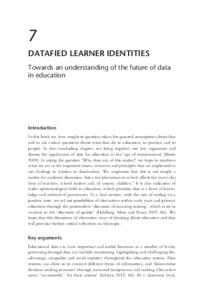Datafied Learner IdentitiesTowards an understanding of the future of data in education
Alice Bradbury, Guy Roberts-Holmes
|
 |
 Diese Seite wurde seit 4 Jahren inhaltlich nicht mehr aktualisiert.
Unter Umständen ist sie nicht mehr aktuell.
Diese Seite wurde seit 4 Jahren inhaltlich nicht mehr aktualisiert.
Unter Umständen ist sie nicht mehr aktuell.
 Zusammenfassungen
Zusammenfassungen
 Educational data can have important and useful functions at a number of levels; governing through data can include monitoring, highlighting and challenging disadvantage, inequality and social injustice throughout the education system. Data systems can allow us to connect different forms of information, and 'democratise decision-making processes' through increased transparency and making 'elite actors more 'accountable' for their actions'. Datafication has intensified processes of performativity, creating a hyper-performative atmosphere where everything must be quantified and accounted for. This chapter focuses mainly on the operation of data within schools, on their impact on practice and pedagogy, subjectivities and strategic responses, but with an awareness that the 'statistical journey' of the data in question continues through onto government comparative websites, such as RAISEonline, that are central to inspection outcomes. Teaching, learning and understanding are essentially political and ethical relationships imbued with power; assessments such as Baseline draw children out of their complex, diverse and distinct cultural backgrounds through a universal 'technique of normalisation'.
Educational data can have important and useful functions at a number of levels; governing through data can include monitoring, highlighting and challenging disadvantage, inequality and social injustice throughout the education system. Data systems can allow us to connect different forms of information, and 'democratise decision-making processes' through increased transparency and making 'elite actors more 'accountable' for their actions'. Datafication has intensified processes of performativity, creating a hyper-performative atmosphere where everything must be quantified and accounted for. This chapter focuses mainly on the operation of data within schools, on their impact on practice and pedagogy, subjectivities and strategic responses, but with an awareness that the 'statistical journey' of the data in question continues through onto government comparative websites, such as RAISEonline, that are central to inspection outcomes. Teaching, learning and understanding are essentially political and ethical relationships imbued with power; assessments such as Baseline draw children out of their complex, diverse and distinct cultural backgrounds through a universal 'technique of normalisation'. Dieses Kapitel erwähnt ...
Dieses Kapitel erwähnt ...
 Dieses Kapitel erwähnt vermutlich nicht ...
Dieses Kapitel erwähnt vermutlich nicht ... 
 Nicht erwähnte Begriffe | Digitalisierung, Eltern, LehrerIn, Schweiz, Unterricht |
 Tagcloud
Tagcloud
 Volltext dieses Dokuments
Volltext dieses Dokuments
 |  Datafied Learner Identities: Artikel als Volltext ( Datafied Learner Identities: Artikel als Volltext ( : :  , 85 kByte; , 85 kByte;  : :  2021-03-21) 2021-03-21) |
 Anderswo suchen
Anderswo suchen 
 Beat und dieses Kapitel
Beat und dieses Kapitel
Beat hat Dieses Kapitel während seiner Zeit am Institut für Medien und Schule (IMS) ins Biblionetz aufgenommen. Beat besitzt kein physisches, aber ein digitales Exemplar. Eine digitale Version ist auf dem Internet verfügbar (s.o.). Es gibt bisher nur wenige Objekte im Biblionetz, die dieses Werk zitieren.









 datafication
datafication Daten
Daten Kinder
Kinder Lernen
Lernen PISA-Studien
PISA-Studien Ranking
Ranking Schule
Schule Statistik
Statistik Biblionetz-History
Biblionetz-History